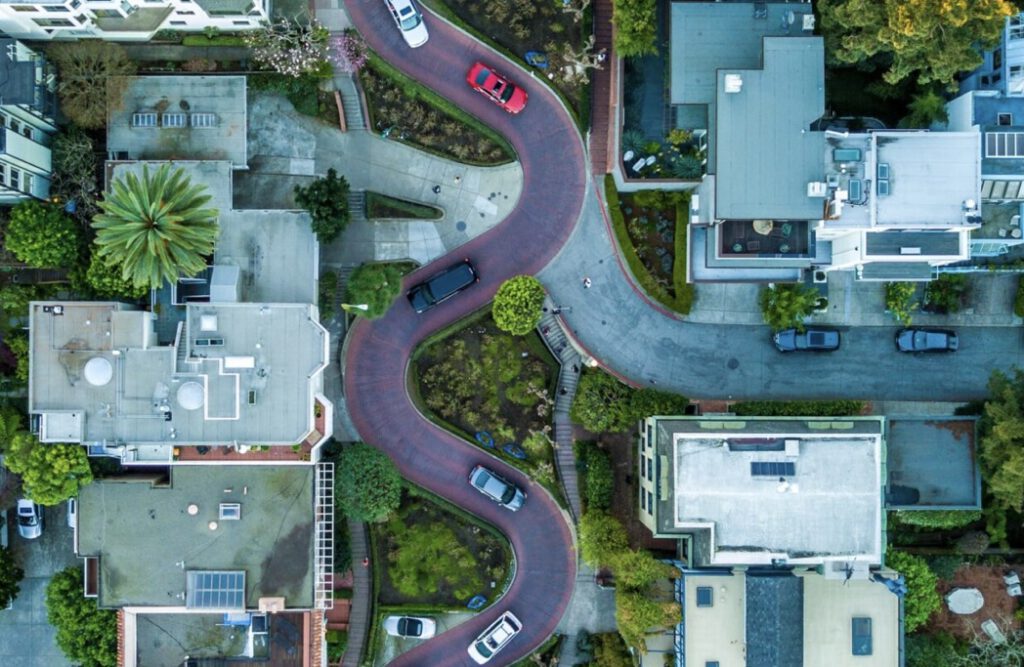
From tinyhomesincanada.ca
The CEO of Petite Homes, an ADU (additional dwelling unit) builder based in Windsor, Ontario, is inspired by the tiny homes he sees in San Francisco. Michael Hoppe shared his thoughts on how communities form and the role ADUs play in changing the Pattern Language of a city.
“It can be very fun. You have these little backyards where everybody congregates.”
“If you go all around San Francisco in the Bay Area, there are so many cute little homes just tucked away in little spaces. Over the years of living in San Francisco, I had seen how people could live in communities that either happened by accident, or people were just making the best out of expensive housing in SF. And it can be very fun. You have these little backyards where everybody congregates.”
Michael grew up in Windsor, Ontario, where he remembers a walkable city center and coffee shops where he was sure to find a friend or two when he stopped by. He feels that new housing is being added in a way that loses what he and others love the most about Windsor. That’s been one of the greatest motivators for starting Petite Homes.

“You end up finding out and discovering that people can live many different stories and lives.”
“We look at affordable tiny living as something that can be very fun, exciting, attractive, and just overall a great life experience. Urban densification to us is actually about building communities. And one thing I like about the Bay Area, and a lot of busier cities that my friends live in, is that community is everything. You get a lot of different kinds of people that all live together. And you end up finding out and discovering that people can live many different stories and lives.”
“I’m an architectural designer. And so, we said, how can we take a flavor of what we’re seeing here in California? And how can we bring it back to Windsor? How can we bring in that flavour, that lifestyle, to Canada?”
“I find in suburban Canada, we have this ideal narrative, this ideal story where we say this is the correct path in life. If you do these things, if you check these boxes. When my boyfriend and I moved out to the Bay Area, we saw people of all different ages, doing all different kinds of things. It’s just a giant mosaic of people living their best life. Just people doing their thing their way. And that really broke my mind, especially coming from Windsor.”
Michael thinks introducing tiny homes into established suburban areas will help provide options for people to write what success means to them, to be more authentic to living their best life. It also helps create more diverse communities in an organic way.
“I do think that we need to reimagine how people live and create community, because that’s where we all start: we all want community.”
“In architecture, one of the conversations we have is around Pattern Language. It’s the patterns of how you move through space, how you interact with space. It forms how we live. For example, a lot of my friends live in the suburbs where the pattern language is very established. Drive up into your driveway. Get out of your car. Go to your door. We watch it consistently play out over and over. But what would happen if we brought in some simple changes? What if we brought in something that purposefully creates community and more mingling and intermixing?”
Michael sees new subdivisions being built that fail at creating a community feel, even when that is their intention. He believes that community needs to happen organically through smaller human-scale decisions, like creating ADUs one by one in existing neighbourhoods.
“All of the world’s most-loved markets, streets, and gardens grew from many human decisions over time – they were not designed all at once. I think a lot of human behavior happens so naturally, and you can’t dictate it. You can influence it, but you cannot dictate.”
“I see a big disconnect in the way developments are built currently. You have developers that only care about the moment of creating and selling for revenue. And then the actual people who buy and live there – these groups are disconnected from each other. It’s a transactional relationship and it’s devoid of human spirit. I want to try and help create housing naturally. No one knows the secret sauce, but if we let individual people build for their needs and learn from that, it might be a better outcome.”
“There are areas in Windsor that developed naturally over time and that’s where the charm of the town is. Everybody knows those places. There are things like corner stores, coffee shops, cafes, restaurants that you can walk to. That builds community. I think we go into it with the spirit of knowing that we can’t dictate, but we can at least give the tools, and take away obstacles.”
Petite Homes is based in Windsor, Ontario | Hours by appointment only.
519-253.4000 | [email protected]
Stay up to date on Petite Homes and everything tiny with the Petite Homes newsletter. Sign up today!

All Prices in CAD.
*Pricing is heavily dependent on market rates, customizations and other factors and, as such, is subject to change.
 A CHRISTOPHER PRESSEY Website
A CHRISTOPHER PRESSEY Website